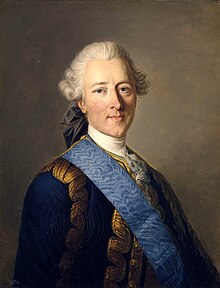Charles Juste de Beauvau-Craon
| Charles Juste | |
|---|---|
| Prince of Craon | |

Charles Juste by Elise Bruyère
|
|
|
Full name
Charles Juste de Beauvau
|
|
| Born |
10 September 1720 Hôtel de Craon, Lunéville, Lorraine |
| Died | 21 May 1793 (aged 72) Hôtel de Beauvau, Paris, France |
| Spouse(s) | Marie Charlotte de La Tour d'Auvergne |
|
Issue
Anne Louise Marie, Princess of Poix
|
|
| Father | Marc de Beauvau |
| Mother | Anne Marguerite de Ligneville |
Charles Juste de Beauvau, Prince of Craon (10 September 1720 – 21 May 1793), 2nd Prince of Craon (1754), Marshal of France (1783) was a French scholar, nobleman and general. The son of Marc de Beauvau, he was also brother of the famous Madame de Boufflers and through her uncle to the poet Stanislas de Boufflers.
Charles Juste was born at the Hôtel de Craon, Lunéville in the capital of the Duchy of Lorraine. His family were the most powerful in Lorraine after the ruling Duke of Lorraine.
His mother, Anne Marguerite de Ligneville, was the mistress of Leopold, Duke of Lorraine, husband of Élisabeth Charlotte d'Orléans (niece of Louis XIV). He was the thirteenth of twenty children.
He married twice; firstly on 3 April 1745 to Marie Charlotte de La Tour d'Auvergne (20 December 1729 – 6 September 1763), daughter of Emmanuel Théodose de La Tour d'Auvergne and his last wife Louise Henriette Françoise de Lorraine. The couple had one child who married into the Noailles family. His first wife Marie Charlotte died of Smallpox aged 33.
Marie Charlotte died in 1763. The next year, on 14 March, he married again; this time to Marie Charlotte Sylvie de Rohan-Chabot, a cousin of Charles, Prince of Soubise. The couple had no children Marie Charlotte Sylvie outliving her husband till 1807.
He entered military service for France and was made a lieutenant of the Cavalry on 10 December 1738; colonel of the guard (Lorraine) on 1 May 1740 and distinguished himself under the leadership of the Duke of Belle-Isle at the Siege of Prague in 1742. Created a Brigadier on 16 May 1746 he was later created a Field marshal on 10 May 1748. He was later elevated to Lieutenant General on 28 December 1758. He gained further distinction in 1762 while serving in Spain.
...
Wikipedia
